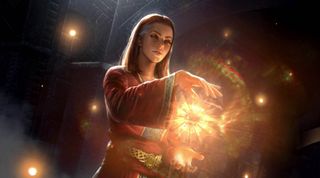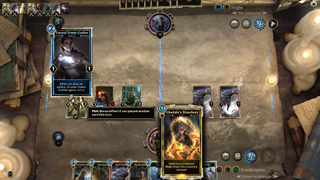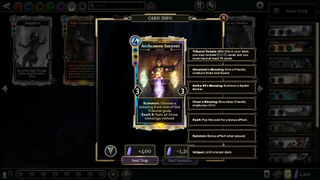The Houses of Morrowind keeps The Elder Scrolls: Legends fresh and exciting
Exploring the latest expansion to Dire Wolf Digital's card game.

The latest expansion set for The Elder Scrolls: Legends, The Houses of Morrowind, arrived last week. This is the game's second full-sized expansion, not including standalone adventures or promotional sets, and includes 149 brand new cards to experiment with.
One of the biggest deals about this set is the addition of three-attribute cards. This is a trope that has been done in similar card games, now brought to TESL, with one noticeable difference: when deckbuilding with the three-attribute cards, you are now tasked with playing a 75 card deck instead of your typical 50 card deck. This seems logical enough: whereas previously, with two-attribute decks, you could assume you had 25 slots per attribute, they simply upped the deck size proportionally to accommodate an additional one.
This brings up some interesting strategic decisions. Traditionally in card games, you want to stick to the bare minimum when it comes to deckbuilding. If the minimum is 60 cards, you should build a 60 card deck. If the minimum is 30 cards, you should build a 30 card deck. The reason for this is that you want the best possible odds to draw your best possible cards every turn. Every card over the minimum decreases your chances to draw your best cards when you need them.

So when you look at a game like Hearthstone, that has 30 card decks, compared with TESL's newly introduced 75 card decks, it does make you wonder about the consistency of the deck or the ability to form a cohesive strategy within it. (Keep in mind you're more than welcome to play your traditional 50 card deck, just so long as you omit any three-attribute cards from it. You're also able to play with up to 100 cards as well, as that's the new deck limit!)
As we consider TESL a competitive card game, I wonder whether or not the tri-attribute cards are powerful enough to justify deck size in a competitive environment, such as the game's Rumble events. I think the most mathematical among us, who value the strategy and competition of games like TESL above all else, might give pause—that 75 cards will dilute your deck and strategy too greatly. Those mostly looking to have fun and do cool things, however, a camp which I often include myself in, will be more willing to make the sacrifice. It's also worth noting that TESL player Blackfall took a Tribunal decklist (Intelligence, Willpower, and Endurance) to Rank #1 this past week, so maybe there's something to three-attribute strategies after all.
Pros and cons aside, I love the design space that adding a third attribute to your deck opens up. If you've built around any of the tri-attribute legendaries, such as Archcanon Saryoni or Duke Vedam Dren, you may have noticed that the decks they're included in have a different feel to them—they just feel a little more epic somehow.

The expansion also introduces with it more single player puzzles. While the novice puzzles aren't immensely difficult, the expert and adept versions will certainly challenge you, and all are an absolute joy. They're rewarding and a great way to pass the time when you're trying to avoid something like ladder anxiety. The ten included puzzles are also an efficient means of introducing players to the four new HoM keywords and how they function: Rally, Betray, Exalt, and Plot. While two of the three puzzle groups are behind a paywall, it's a very reasonable one for the 31 puzzles you'll unlock, especially considering the rewards you also receive along the way. Completing the first two groups alone took a few hours, already making the price point well worth it for me.
The biggest gaming news, reviews and hardware deals
Keep up to date with the most important stories and the best deals, as picked by the PC Gamer team.
If you're starting to wonder how many keywords is too many, you're not alone. In the five releases TESL has had, there has been a total of 17 keywords. In this most recent set, two of the keywords (Rally and Exalt) are similar or identical in name to keywords from Magic: The Gathering. While I always expect some overlap in card games (sometimes there are only so many names that can fit a mechanic), having keywords with names so closely related to others could get confusing for someone with previous card game experience to pull from.
Another curiosity that HoM brings up for me is when there will be too many cards in the format—and by 'the format', I mean 'the only format that currently exists in TESL'. When will older sets rotate, creating separate formats, similar to other games? With Houses of Morrowind, TESL has the following sets available to play with: Core Set, the Dark Brotherhood adventure, the Heroes of Skyrim expansion, the Clockwork City adventure, and the Houses of Morrowind expansion.
And that doesn't include things like monthly rewards, the Madhouse Collection, or the Forgotten Hero Collection. That's a lot of playable cards: around 855 if my math is correct. There are currently around 1,100 legal cards in Hearthstone's premier format, Standard, which will drop down to around 900 after three sets rotate out with the release of The Witchwood expansion this week. With TESL quickly approaching that number, it may be time to look at rotating older cards and sets to keep a dominant format fresh and decrease the barrier of entry for new players looking to get into the game.
I think my biggest question, and one that isn't exclusive to this release, is how TESL will fare in the future. As one of Bethesda's original content creators for the game, I've personally loved it from the beginning. It's taken what other digital card games have done well and added onto it. That doesn't, however, change the success of Hearthstone or the potential success of Artifact, Valve's own upcoming digital card game. I want nothing more than for TESL to succeed in the long term, and I think each release has taken the game in a new and exciting direction, which is momentum I hope they're able to both keep up and build on.
If you're a TESL fan, an Elder Scrolls fan, or simply a fan of card games, I'd definitely recommend giving Houses of Morrowind a spin. I never got the feeling that Dire Wolf Digital was simply reskinning previously released cards, which is always a good sign when exploring a new expansion. The set has a feel all its own, unique from previous offerings such as Heroes of Skyrim, with enough new and innovative mechanics to keep things fresh.
Disclaimer: as Frank mentions in the piece, he's previously created content for Bethesda on TESL.
Most Popular

